A round-up of activities of the UN system in Somalia in December 2024
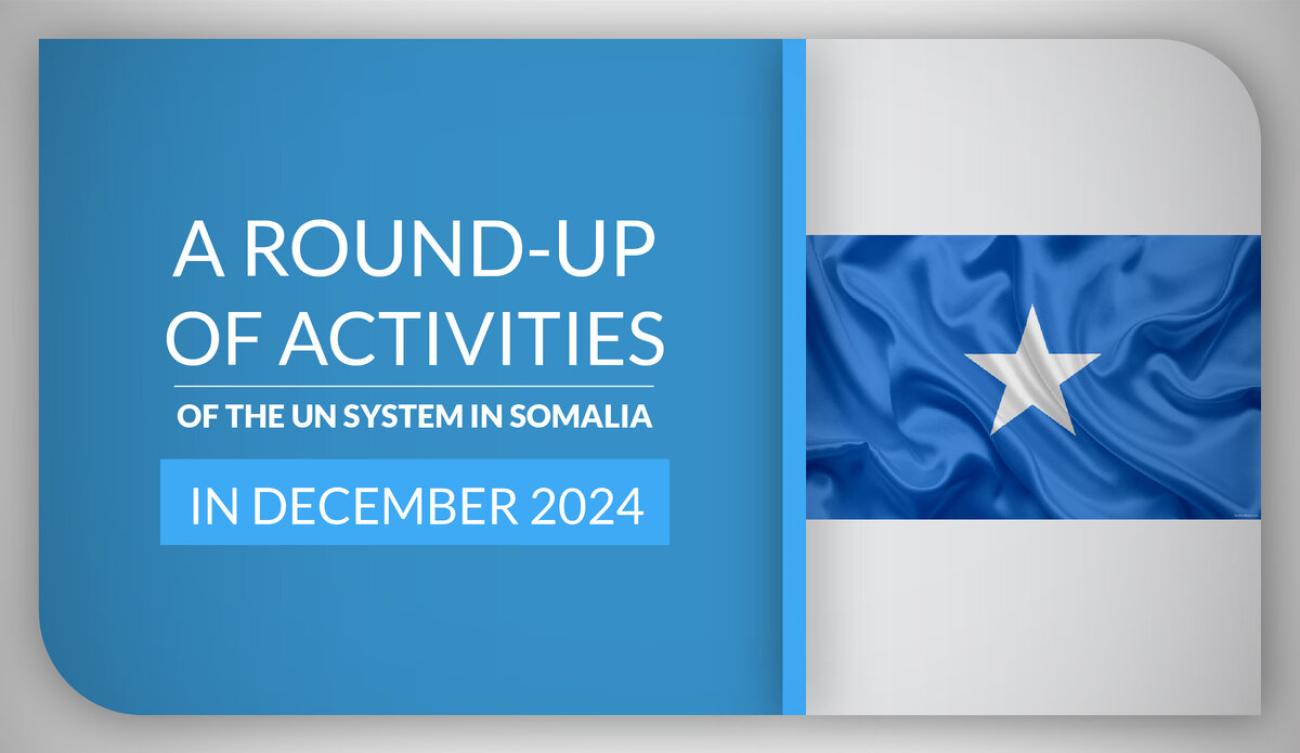
A quick snapshot of some of the work of the United Nations in support of Somalia's priorities
A round-up of activities of the UN system in Somalia in December 2024
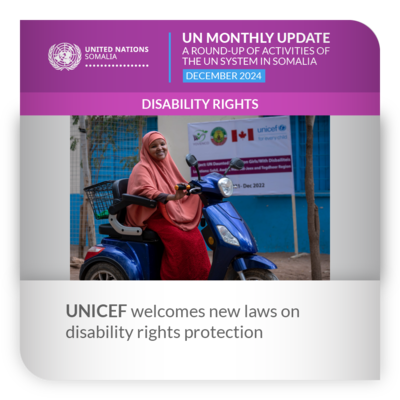 |
Disability rights | UNICEF welcomes new laws on disability rights protection UNICEF welcomed the new Somali Disability Rights Protection Law as significant legislation to protect the rights and dignity of people with disabilities while ensuring access to essential services, prohibiting discrimination, and promoting full societal participation. The UN agency added that the law guarantees rights to education, health care, and employment while holding institutions accountable for inclusivity. As well, its key focus is on accessibility and inclusion, requiring schools and other institutions to accommodate students with disabilities and protect those with disabilities during emergencies, including them in disaster planning and access to resources. The Joint Programme on Human Rights (Phase II), led by UNICEF and UNTMIS, played a critical role by enabling stakeholder coordination, providing technical expertise, and aligning national disability rights priorities with international human rights standards. |
|
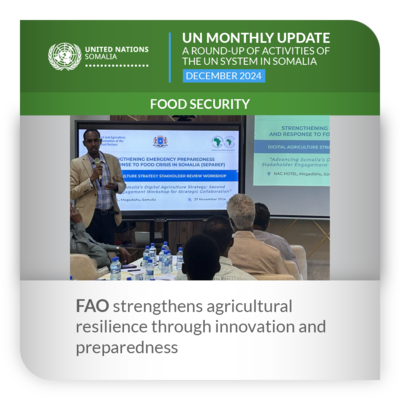 |
Food security | FAO strengthens agricultural resilience through innovation and preparedness In collaboration with the federal Ministry of Agriculture and Irrigation and key stakeholders, FAO conducted a comprehensive review of Somalia’s Digital Agriculture Strategy under the ‘Strengthening Emergency Preparedness and Response to Food Crisis in the East and Horn of Africa’ project, funded by the African Development Bank. This review, part of the ‘Empowering Agriculture Through Digital Technology’ initiative, aims to drive innovation and build a sustainable, tech-powered future for Somalia’s agriculture sector. The process involved consultations with key partners to strengthen the use of digital tools in agriculture, enhance data-driven decision-making, and boost the resilience of food production systems, ultimately supporting efforts to address the food security crisis affecting more than seven million people in Somalia. |
|
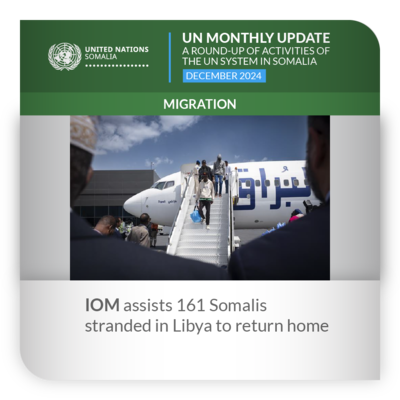 |
Migration | IOM assists 161 Somalis stranded in Libya to return home IOM supported the return to Somalia of a group of 161 Somali migrants stranded in Libya – the majority of the returnees were young men and women under 30, including minors, who had been stuck in Libya for several months. Upon their return, they received assistance to address immediate needs, including pocket money, temporary accommodation, medical assistance (such as mental health and psychosocial support), and onward transportation for those reuniting with families outside Mogadishu. |
|
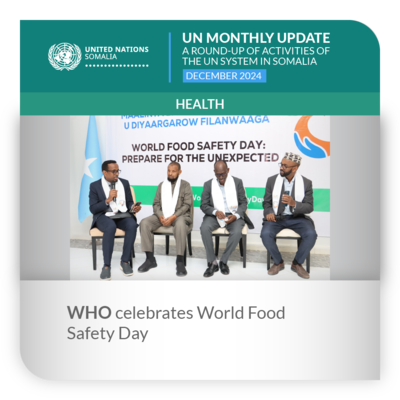 |
Health | WHO celebrates World Food Safety Day For the first time ever, Somalia celebrated World Food Safety Day (WFSD) in collaboration with WHO and the Somali Bureau of Standards. A forum held in Mogadishu brought together government officials, international partners, private sector actors and representatives from academia to discuss food safety in Somalia under the theme of this year’s WFSD: ‘Food Safety: prepare for the unexpected.’ WFSD aims to draw attention and inspire action to help prevent, detect and manage foodborne risks, contributing to food security, human health, economic prosperity, agriculture, market access, tourism and sustainable development. |
|
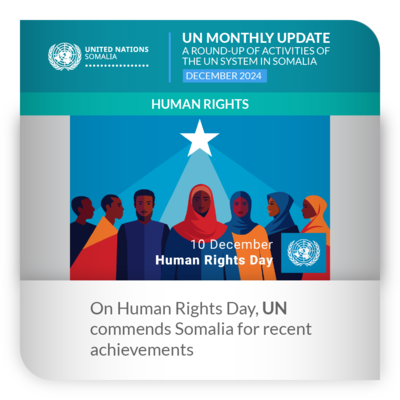 |
Human rights | On Human Rights Day, UN commends Somalia for recent achievements Marking Human Rights Day, observed on 10 December, the United Nations commended Somalia for its recent achievements in promoting and protecting the rights of all Somalis. Notable among these achievements in the past year was the signing of the Somali National Disability Rights Protection Act into law. “Somalia can rightly take pride in the welcome and positive step forward with the Disability Rights Protection Act – it will serve to eliminate barriers to the full enjoyment of the rights of persons with disabilities and their full inclusion in society,” said the UN Secretary-General’s Acting Special Representative for Somalia, James Swan. “It will also provide them with a legal framework for protection and support in terms of participation in public affairs and access to service opportunities,” he added. |
|
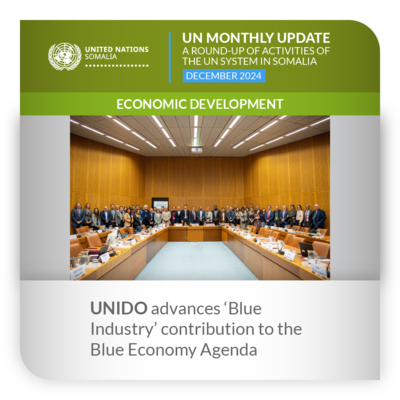 |
Economic development | UNIDO advances ‘Blue Industry’ contribution to the Blue Economy Agenda Representatives from UNIDO’s operation in Somalia took part in a hybrid Expert Group Meeting at UNIDO’s Headquarters in Vienna, marking a major milestone in advancing the ‘Blue Economy Agenda’ through its Blue Industry initiatives. The gathering focused on shaping UNIDO’s Blue Industry Programmatic Framework, guided by the discussion paper ‘Blueprint for Sustainable Development: The Blue Industry Contribution to the Blue Economy Agenda.’ Participants explored mechanisms to integrate and scale up blue industry interventions, including the Blue Industry Track of UNIDO’s ScaleX Accelerator. The event drew 334 participants from 84 countries, including technical experts, government representatives, international organizations, private sector representatives and academia. |
|
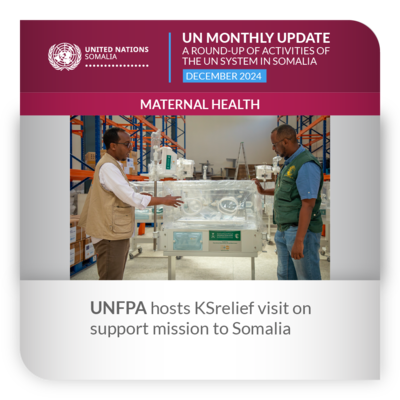 |
Maternal health | UNFPA hosts KSrelief visit on support mission to Somalia UNFPA hosted a visit by a representative of the King Salman Humanitarian Aid and Relief Center (KSRelief), Ibraheem Abdulkadir Mahmood, who visited the federal Ministry of Health’s warehouse in Mogadishu. The warehouse stores essential neonatal intensive care unit equipment, such as incubators, radiant warmers and monitors – crucial resources for enhancing newborn care and helping to reduce mortality rates across the country. As part of his supportive supervision efforts, the KSFRelief project manager also toured several key implementing partner centers, including the Fistula Centre in Daynile and the Hodon BEmoNC, both of which are supported by UNFPA and funded by KSRelief. According to UNFPA, KSRelief's ongoing support has been instrumental in ensuring that these critical services continue to be available, directly impacting the health and well-being of vulnerable populations in Somalia. |
|
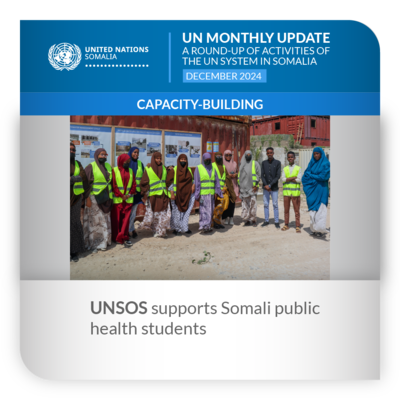 |
Capacity-building | UNSOS supports Somali public health students UNSOS continued its capacity-building activities with the participation of 32 Somali students in a pilot initiative for fourth-year public health students at Jazeera University. The field training excursion was aimed at bridging the gap between theoretical learning and practical application, and provided the students with a firsthand understanding of the waste sector as well as how UNSOS is minimizing risk to society and the environment in Somalia. “The UNSOS training was crucial for us because we practiced topics we had only learned theoretically before. It is essential to align practical experience with theory for better understanding of waste management. We gained a lot from this training,” said one of the students, Yonis Abukar Mohamed. |
|
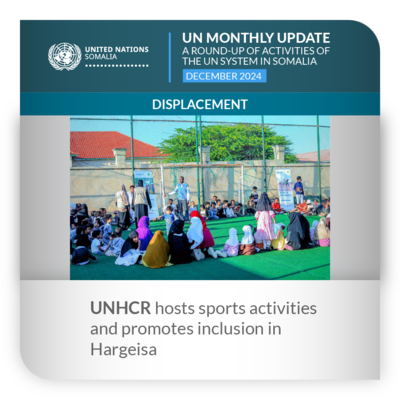 |
Displacement | UNHCR hosts sports activities and promotes inclusion in Hargeisa UNHCR leveraged sports as a powerful tool for protection and community building in Hargeisa with the holding of football and volleyball tournaments that brought together refugees, internally displaced people, returnees, and host community members. According to the UN refugee agency, these events emphasized diversity by including individuals with physical challenges, creating an inclusive space for connection, empowerment and participation. UNHCR recognizes the importance of sports in fostering social cohesion, promoting peaceful coexistence, and addressing vulnerabilities. By encouraging teamwork and mutual understanding, these activities break down barriers, strengthen communal ties, and contribute to creating a more inclusive and resilient society. Sports initiatives like these align with UNHCR's commitment to building unity, trust, and support among displaced and host communities, paving the way for long-term stability and integration. |













